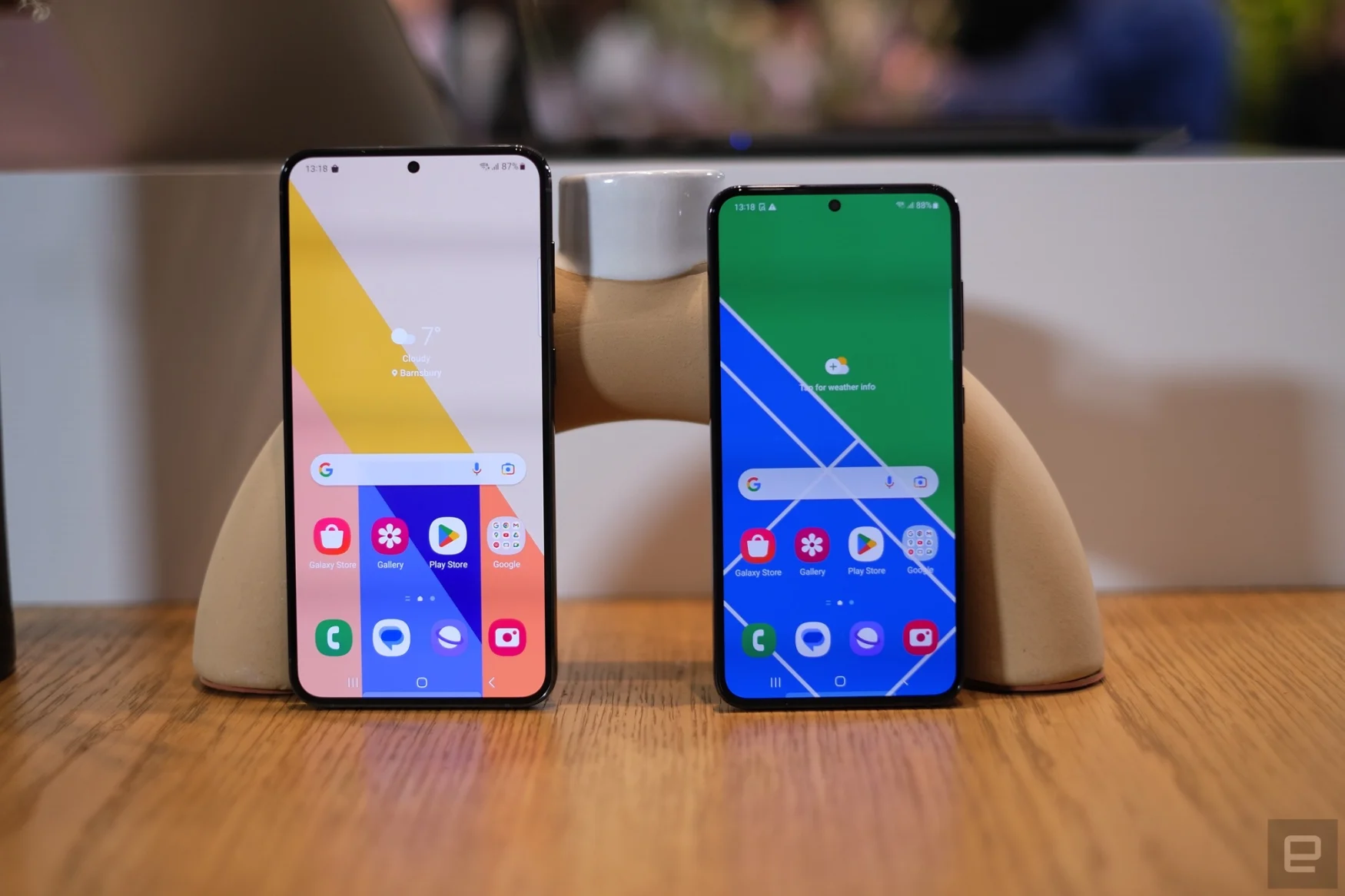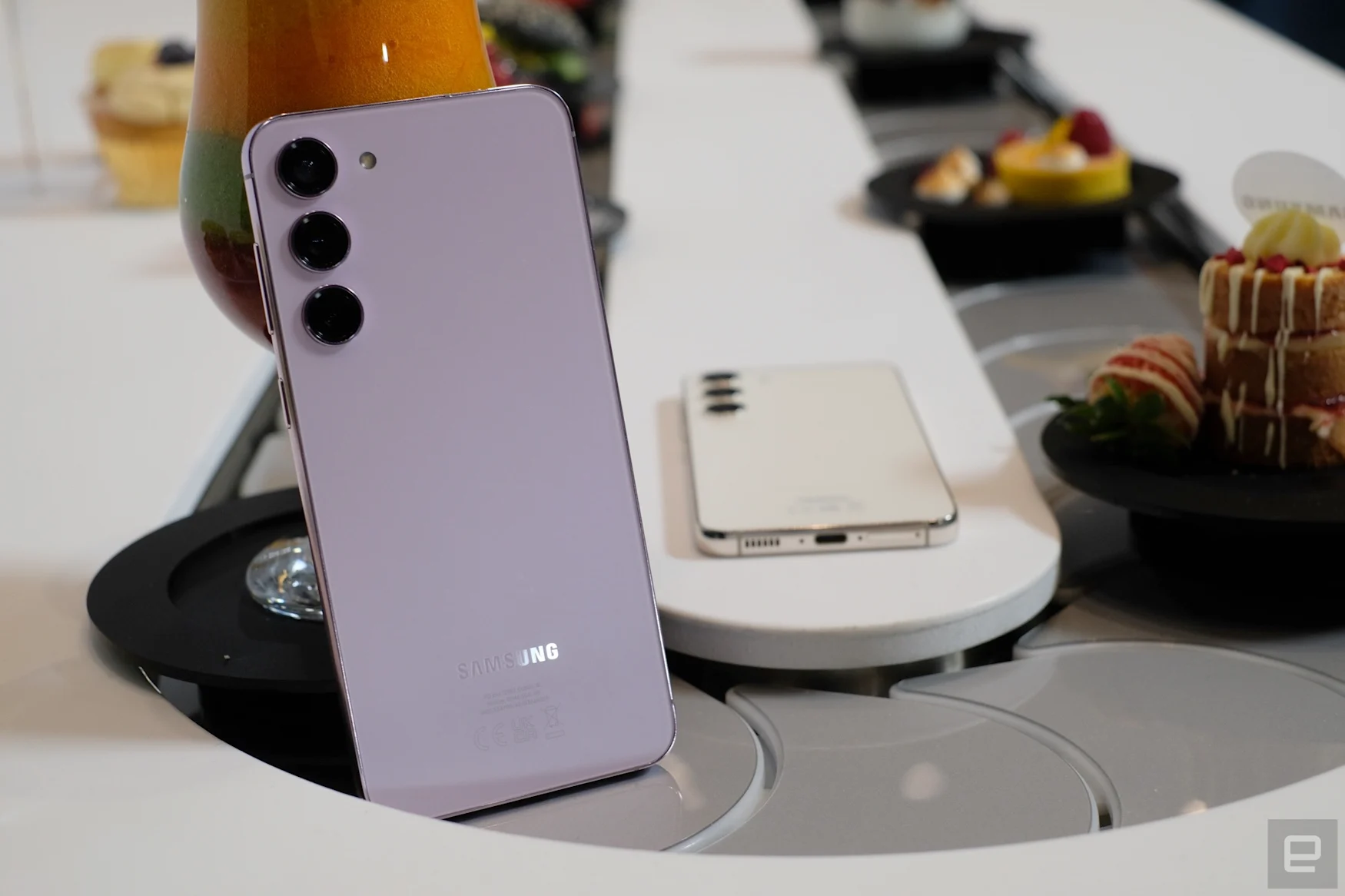They do what Samsung does best, but don’t push the envelope.
While the Galaxy S23 Ultra might be the 200-megapixel camera-toting showstopper, Samsung is also unveiling two more premium smartphones. The Galaxy S23 and S23+ feature a minor redesign, some useful software tricks and, this time, almost spec parity across the two devices.
Even more so than last year’s Galaxy S22 series, the 6.1-inch S23 and 6.6-inch S23+ are very, very similar. The main differences are the screen size, battery capacity and price. Although, the S23+ also has ultrawideband support, which could help with precision location hunting of any compatible Bluetooth trackers. Besides that, these are the same phone.
What’s new for 2023? Well, a mild redesign. The company has removed the camera cutout on the back of both devices, even though it’s another trio of cameras. The S23 series, regardless of which phone you choose, will launch in a range of colors: black, off-white, green and lavender. I like the muted green.
The Galaxy S23’s AMOLED FHD+ screen is capable of 120Hz refresh rates and now has a peak brightness of 1,750 nits – one of the notable upgrades from last year’s S22, which topped out at 1,300 nits. Beyond the bigger size, the 6.6-inch Galaxy S23+ has an identical screen and both are bright, vivid and smooth. Screens are what Samsung, always, does well on the Galaxy S series.

Engadget, Mat Smith
The entire S23 series doubles the number of components made from recycled materials, up to twelve. That includes “pre-consumer” recycled glass for the front screen and back cover. In addition, Samsung used recycled aluminum for the SIM tray and volume keys. It also sourced recycled plastic from water barrels, discarded fishing nets and PET bottles for the speaker modules and in the construction of the back glass.
The camera specifications are recycled too: a combination of 50-megapixel wide, 12MP ultra-wide and 10MP telephoto sensor. In Samsung’s defense, last year’s S22 series beefed up cameras substantially. This year’s update is more of the same. The cameras seemed responsive and capable enough during our brief hands-on, but we’ll have to wait and see if they perform better than their predecessors in real life.
At least there are some imaging software advances. You can now capture full 50MP images in Samsung’s Expert RAW format, which used to be limited to 12MP. Video capture also picks up upgraded video stabilization. The S23 analyzes movements and compensates for your shakiness at up to two times wider angles than its predecessor. Rounding out the camera hardware, both the S23 and S23+ have an upgraded 12-megapixel selfie camera, which features a Super HDR mode that captures 60 frames per second in higher dynamic range.
While the cameras may not be pushing the boundaries of smartphone photography (that’s the S23 Ultra’s job) there are bigger batteries in both phones year. The Galaxy S23 has a 3,900mAh battery (up from the 3,700mAh cell in the S22), while the Galaxy S23+ has a 4,700mAh battery, 200mAh bigger than the S22+.
This year One UI update also throws in a few new useful features. Typically, Google’s Android updates dominate a “what’s changed” list between S-series phones. But this year there are some Samsung-made additions worth highlighting. Let’s start with the improved comfort mode. The S23 will now adjust contrast levels and colors to reduce the screen’s harshness later in the day. The S23 series also has a new image clipper – no S-Pen needed – replicating the addictive sticker feature that Apple introduced on iPhones in iOS 16.

Engadget, Mat Smith
Our first impressions: it’s not a particularly exciting year for Samsung’s smaller flagships. This year especially, The Galaxy S23 Ultra is clearly the company’s favorite child – check out our impressions on Samsung’s most expensive phone here. While these are still premium smartphones, we’d wait for our full review if you’re using an S22 and considering an upgrade. The Galaxy S23 and the Galaxy S23+ are available to preorder now. The S23+ starts at $1,000 with 256GB of storage, while the S23 starts at $800 with 128GB of storage.
All products recommended by Engadget are selected by our editorial team, independent of our parent company. Some of our stories include affiliate links. If you buy something through one of these links, we may earn an affiliate commission. All prices are correct at the time of publishing.